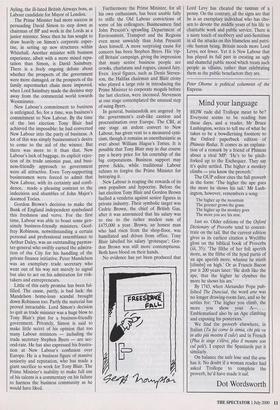Mind your language
HOW rude did Trollope mean to be? Everyone seems to be reading him these days, and a reader, Mr Bruce Lushington, writes to tell me of what he takes to be a bowdlerising footnote to the Oxford paperback edition of Phineas Redux. It comes as an explana- tion of a remark by a friend of Phineas about a rival MP: 'He's to be pitch- forked up to the Exchequer. They say it's quite settled. The higher a monkey climbs — you know the proverb.'
The OUP editor cites the full proverb in the form: The higher the ape goes the more he shows his tail.' Mr Lush- ington, however, remembers a song:
The higher up the mountain The greener grows the grass; The higher up the monkey goes The more you see his arse.
Just so. Older editions of the Oxford Dictionary of Proverbs tend to concen- trate on the tail. But the current edition gives as its earliest citation a Wyclifite gloss on the biblical book of Proverbs 35): 'The filthe of her foli aperith more, as the filthe of the hynd partis of an ape aperith more, whanne he stieth [climbs] on high.' Or as Francis Bacon put it 200 years later: 'He doth like the ape, that the higher he clymbes the more he shows his ars.'
By 1743, when Alexander Pope pub- lished The Dunciad, the word arse was no longer drawing-room fare, and so he settles for: 'The higher you climb, the more you show your A—. . . . Emblematised also by an Ape climbing and exposing his posteriors.'
We find the proverb elsewhere, in Italian (Tu fai come la simia, chi pies va in alto pia mostra it culo) and in French (Plus be singe s'eleve, plus it montre son cul pele'). I expect the Spaniards put it similarly.
On balance the tails lose and the arse has it. No doubt if a woman reader had asked Trollope to complete the proverb, he'd have made it tail.
Dot Wordsworth


























































 Previous page
Previous page